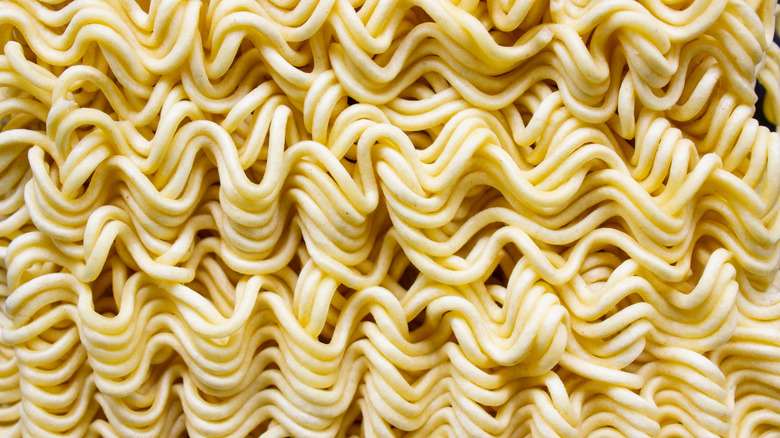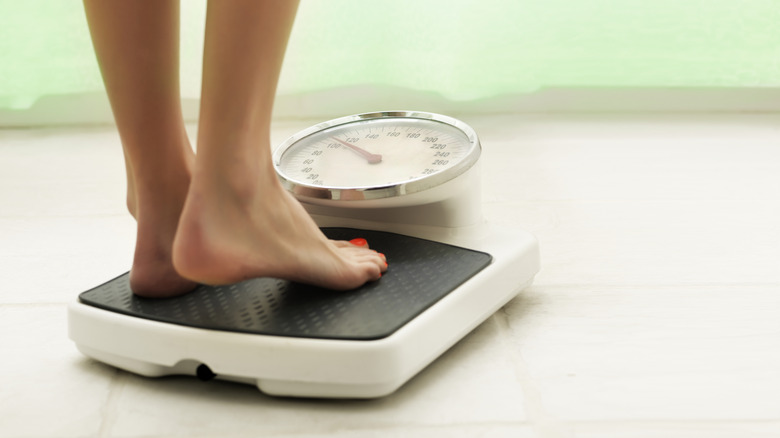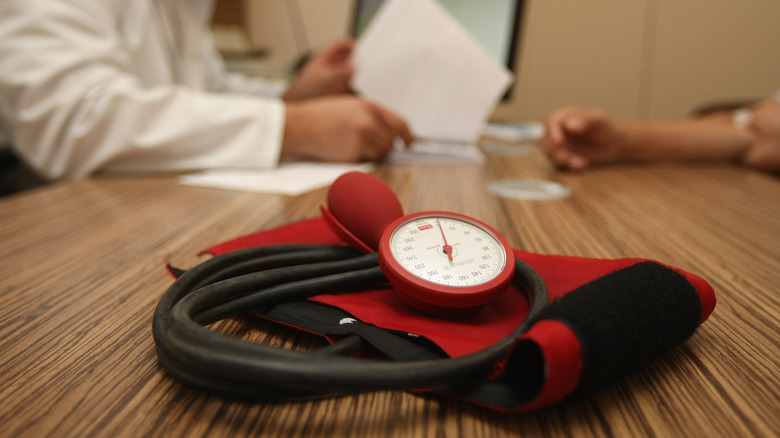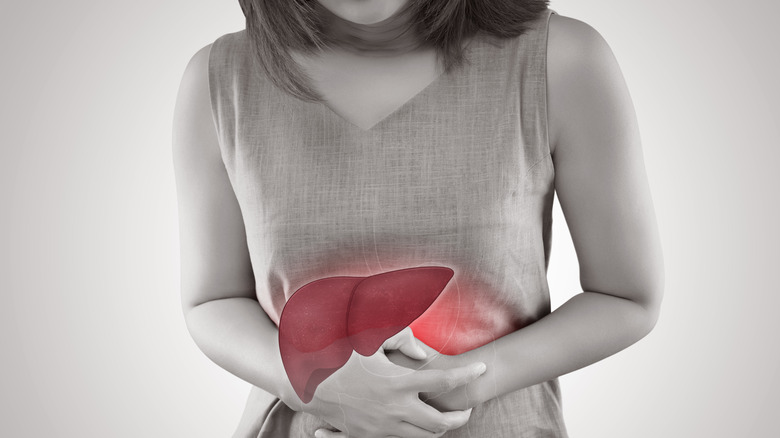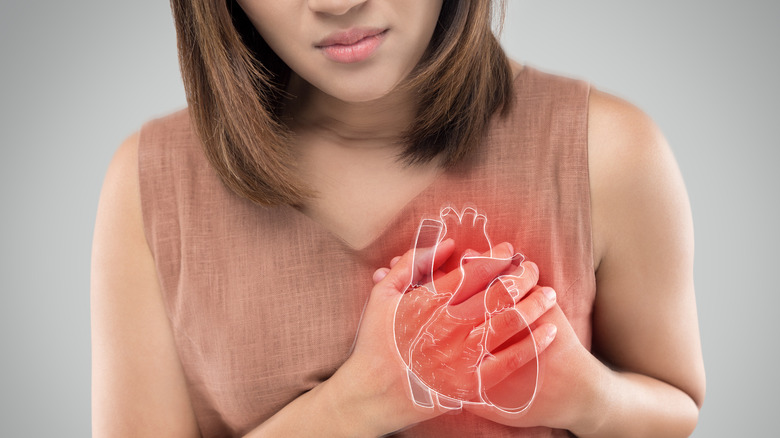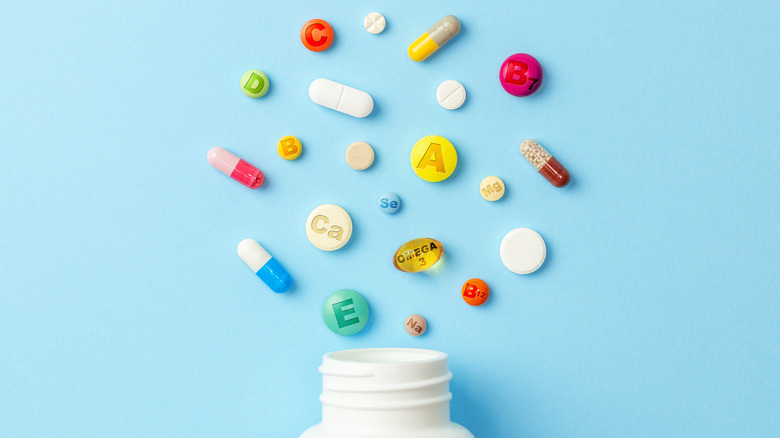What Happens To Your Body When You Eat Instant Ramen Every Day
No matter how sophisticated your palate may be, you have to admit it: On certain late nights or rainy afternoons, nothing's more satisfying than a steaming bowl of squiggly instant noodles in a umami-laden broth. Instant Ramen is not only rich, flavorful, and satisfying, but it's also dirt cheap and can be enjoyed in just minutes whenever the mood hits. And because it's non-perishable, you can always keep a few packets on hand for those times you need a quick bowl of comfort.
But while instant Ramen may be good for your soul — and your budget — it's not so great for your body. Like most highly-processed foods, it's high in sodium, saturated fat, and preservatives, according to the Keck School of Medicine at the University of Southern California. While all these things are safe in small doses, overdoing it can lead to serious health problems, including obesity and heart disease. So, no matter how much you love your instant Ramen, you'd be wise to cut it out of your regular meal rotation and relegate it to special-treat status — or you may pay a high price for your habit later.
Expect to gain weight when you eat lots of Ramen
Don't you hate how some of the most luscious and satisfying foods are also the most fattening? Sadly, we can put instant Ramen on this list. According to the Keck School of Medicine, just one of those innocent-looking blocks of noodles (plus its broth) contains 14 grams of saturated fat, which equates to about 40% of your body's everyday needs. Some of this fat may be lurking in the broth (which is why it tastes so rich), but most of it comes from the noodles themselves. They come pre-cooked, and during manufacturing they're first steamed until cooked through, then fried to dehydrate them and make them shelf-stable, according to Food Unfolded. Frying also makes the noodles more porous, enabling them to cook faster, according to Kids Web Japan.
This means that when you enjoy a serving of instant Ramen, you're essentially enjoying a big helping of fried noodles. This may not always be a bad thing, but if you eat Ramen every day — along with two other normal-sized meals — you're taking in a lot more fat than your body needs, and that fat may well end up on your hips. Luckily, Kids Web Japan notes that some instant Ramen brands now air-dry their noodles, instead of frying them. So, you might want to seek these brands out if you want to enjoy Ramen without all the calories.
Your blood pressure may go up from eating too much Ramen
Be wary of that little foil flavor packet inside your package of Ramen — it may be where all the flavor in your bowl of Ramen comes from, but, from a nutritional standpoint, it's a little packet of trouble. One serving of Ramen can contain up to 1820 milligrams of sodium, according to the Keck School of Medicine. This is close to two-thirds of the FDA's recommended daily intake — which means that unless you're mindful to avoid consuming any other sodium for the rest of the day, you run the risk of overloading your system with the stuff.
So, why is this a problem? While your body needs to maintain a certain level of sodium to function at its best, too much sodium can contribute to high blood pressure, according to the American Heart Association. And high blood pressure, in turn, can raise one's risk for other dangerous conditions, such as heart failure and stroke. An easy workaround is to use just half the seasoning packet (it'll still be plenty flavorful) or ditch it altogether for a healthier homemade sauce.
Your liver will need to work overtime if you eaten Ramen noodles every day
Instant Ramen is made for a long shelf life, which means that, by design, it's hard to destroy. Its battery of shelf-stable ingredients, including preservatives, artificial flavorings, artificial sweetening, and other additives, help preserve the Ramen's texture, stability, and flavor. And they do their job well, which is why instant Ramen has become a favorite pantry staple.
Unfortunately, the ingredients that make instant Ramen nearly indestructible also make it tough to digest, and the tough work of breaking down and processing an instant Ramen meal can be super hard on your liver, according to the Keck School of Medicine. If your liver is overworked, it starts storing fat in its own cells, and this fat buildup can damage your liver if not controlled. And, since your liver is a vital organ — and you only get one — this is not something you want. Of course, almost all healthy people can enjoy an occasional bowl of instant Ramen and digest it with no drama. But, if you value your liver, it's a good idea to keep your consumption of instant Ramen and other processed foods in check.
Your digestive tract will be stressed from eating too much Ramen
You'd think that a bowl of soft, soupy noodles would be the easiest meal in the world for your body to digest. But you'd be wrong. Instant Ramen is a far cry nutritionally from the therapeutic bowl of homemade chicken noodle soup it resembles, and your body has to do a whole lot more work to break down instant Ramen than it would for most other foods. As WCVB reported, Dr. Braden Kuo, a gastroenterologist at Massachusetts General Hospital, did the hard work of quantifying exactly how hard instant Ramen is to digest: He ran a study in which participants swallowed pill cameras and ate instant and fresh Ramen on alternate days. Then he monitored how long it took for each type of Ramen to move through the digestive system.
Footage from the cameras revealed a graphic difference. The fresh noodles were fully digested within an hour or two, while the instant noodles stayed stubbornly intact and undigested in the stomach hours after eating. The video footage showed the eaters' stomachs actively moving back and forth as they attempted to break up the noodles. While Kuo told WCVB that further study would be needed to determine the long-term impact of instant Ramen on the digestive system, he added that, even after seeing the video footage, he still occasionally enjoys it himself.
Eating instant Ramen every day raises your risk of metabolic syndrome
Here's yet another burden only women must bear: If you're a woman who eats instant Ramen regularly, you're putting yourself at a significantly greater risk of metabolic syndrome — an ugly mix of obesity, high cholesterol, high blood sugar, and high blood pressure, according to the Harvard School of Public Health. Together, these conditions can raise your risk of heart attack, diabetes, and other conditions.
A Harvard study of 10,711 adults in South Korea, the instant Ramen-eating capital of the world, revealed this finding. The researchers specifically found two primary dietary patterns among the people studied: a diet based on traditional foods and one based on processed foods. While no correlation was found between these patterns and metabolic syndrome, a fondness for instant Ramen — and eating it two or more times a week — was linked to a 68% higher risk of metabolic syndrome in women. Oddly, no such correlation held for men.
According to The New York Times, this could be because women are more sensitive to the effects of carbohydrates, saturated fat, and sodium after menopause. Alternately, as the study's authors suggest, women in the study may have reported their dietary habits more accurately than the men — a polite way of suggesting the guys might not be fessing up to their Ramen habit.
Bloating and fluid retention are risks when eating Ramen noodles regularly
As if all the calories in your favorite packet of Ramen weren't enough to worry about, the dorm room staple has yet another nasty way to mess with your body. Because of its high sodium content, instant Ramen can contribute to fluid retention and bloating, according to Shape. And if you're a Ramen connoisseur and eat your noodles the traditional way — by slurping, rather than biting them — you'll be swallowing a lot of air as well, which can further contribute to that gassy, bloated feeling. (Despite this drawback, there is a principled reason for the slurping — it cools the Ramen down so you don't burn your mouth with hot broth, and, according to Smithsonian Magazine, it also aerates the noodles, allowing you to better experience its flavors.)
If you're still craving the sensual experience of slurping your favorite bowl of Ramen but would rather not feel like you've swallowed a balloon afterward, Shape suggests a couple of workarounds: Top your Ramen with fiber-heavy vegetables to facilitate digestion, and finish your meal with a fresh fruit dessert (the magazine especially recommends pineapples and kiwi). These healthy fruits will help your body process your Ramen feast more efficiently.
Eating instant Ramen every day will raise your risk of heart failure
A comforting bowl of instant Ramen noodles may feel like just what you need when you're a little blue — but too much of it can literally break your heart. According to Live Science, because of its high levels of sodium and saturated fat, instant Ramen can raise your chances of high blood pressure and high cholesterol, which can, in turn, make you more vulnerable to heart failure. And, surprisingly, the link between heavy Ramen consumption and these conditions was even more pronounced in young, physically active women. So, sorry, your daily workouts and otherwise virtuous diet won't save you from the effects of a Ramen addiction.
But if the idea of giving up your favorite instant Ramen leaves you heartbroken, don't despair. As with most dietary matters, moderation is your key to staying healthy. "Number one, don't eat it every day," New York University nutritionist Lisa Young told Live Science. "Number two, portion control." Young recommended supplementing smaller servings of Ramen with healthier, less-processed ingredients such as vegetables.
Your risk of a stroke will increase from eating too much instant Ramen
We all love instant Ramen because it's such an affordable and easy meal to make. But, unfortunately, indulging in too much of it can do a permanent number on your brain. The savory seasonings that make instant Ramen so addictive contain high amounts of sodium, which, according to the American Heart Association, can raise your chances of experiencing a stroke. And, according to the Keck School of Medicine, women who eat instant Ramen regularly are at especially high risk for heart attack, stroke, and other conditions. (Yeah, we know — life isn't fair.)
An occasional special-treat bowl of instant Ramen probably won't hurt you. But with just a little more effort and planning, you can make your own healthy alternative, as New York University nutritionist Lisa Young recommended in Live Science. "You can easily make noodles, homemade pasta, ground-rice pasta and veggies," she said. It won't be exactly the same as watching that square of curly noodles unravel in boiling water as you pour in a sachet of mystery powder — but it'll scratch the same itch and you'll feel much better after eating it.
Your eyesight might get wonky from eating Ramen noodles every day
If you notice your vision acting up after an instant Ramen binge, it's not just your imagination. Visual disturbances are a known (albeit, relatively uncommon) effect of eating Ramen noodles, and they're caused by a sensitivity to TBHQ, a preservative commonly used in instant Ramen and other processed food, according to Cooking Light. As Healthline explains, TBHQ "acts as an antioxidant," so it is used to keep oils and other perishable ingredients in processed foods from becoming rancid over time.
While the FDA considers eating instant Ramen to be safe for human consumption (in small doses), Healthline reports that TBHQ consumption has also been linked to a number of health problems in lab rats. These include neurotoxic effects, liver enlargement, and convulsions. Of course, you're not a rat and may not respond to TBHQ in the same way as a rat. But if you're sensitive to artificial ingredients (or simply prefer to minimize their presence in your diet), you'd be wise to cut back on your instant Ramen consumption.
Eating instant Ramen every day won't give your body the nutrients it needs
A big serving of instant Ramen may feel like a supremely filling and satisfying meal. But, enjoyable as it is, it's not very nutritious. While you'll get more than your share of calories and fat from an average packet of Ramen, you won't get much else in terms of nutrients, according to Health Plus. Instant Ramen is also low in fiber and protein, both of which are essential for a healthy diet. And, while instant Ramen does include small amounts of micronutrients, such as niacin and riboflavin, there are plenty of meals that provide more nutrients with less sodium and fat.
Studies have also linked instant Ramen consumption to poor overall diet quality, finding that regular consumers of instant Ramen consumed fewer nutrients (including protein, vitamin C, vitamin A, calcium, and iron), than those who didn't eat Ramen regularly (via Health Plus). It's unclear if the inferior nutritional intake of instant Ramen superfans is due to dietary preferences, budgetary constraints, or some other factor. But it is clear that instant Ramen should not be your first choice for a meal if nutrition is a priority.
You might — or might not — reduce your cancer risk if you eat instant Ramen regularly
It's no secret that instant Ramen is full of preservatives and other artificial ingredients — together, they not only allow manufacturers to cram a lot of intense flavor into a small package, but also to ensure everything maintains its intended texture and flavor after weeks — or even months — of storage.
One of the most controversial of these ingredients is the preservative TBHQ, an artificial antioxidant used to prevent the oils in instant Ramen from becoming stale, according to Cooking Light. Besides its use in processed foods, it's also used as a preservative in some paints and varnishes. And, while legally permitted as a food additive, Cooking Light noted that it's been linked to vision disturbances in humans and to neurological disorders in rats.
But, surprisingly, a study in Current Drug Metabolism (cited in PubMed), found evidence that consumption of TBHQ may have an anti-carcinogenic effect due, in part, to its function as an antioxidant. But the authors of the study also acknowledged that several other studies have linked heavy consumption of TBHQ to increases in cancer, though the factors linking the two "are not well understood." In other words, the jury's still out whether TBHQ contributes to cancer. So, to be safe, you might want to limit your consumption of TBHQ-heavy foods such as instant Ramen.
Eating a ton of instant Ramen might affect your behavior
Instant Ramen has a well-earned reputation as a soothing and calming treat, but, according to Healthline, it can aggravate the symptoms of attention-deficit hyperactivity disorder (ADHD) in some people.
This is because a common ingredient in instant Ramen, the preservative TBHQ, has been linked to symptoms of ADHD: According to WebMD, it's among the foods and food ingredients prohibited in the Feingold Diet, which was initially intended to reduce the symptoms of ADHD in children. The Feingold diet, devised by pediatrician and allergist Benjamin Feingold, is based on the premise that removing certain foods and food additives from one's diet (including artificial colorings, flavorings, fragrances, and sweeteners, along with the preservatives TBHQ, BHA, and BHT) can alleviate symptoms of ADHD and other behavioral disorders.
WebMD noted, however, that research has found mixed results on the effectiveness of the Feingold Diet, and some researchers believe the diet is only effective for those who have a sensitivity to artificial ingredients. Still, if you want to reduce the amount of artificial ingredients you're consuming for whatever reason, cutting back on instant Ramen may be an easy place to start.
Eating Ramen noodles every day may raise your chances for kidney disease
Bad news: Your instant Ramen habit isn't doing your kidneys any favors. As the Keck School of Medicine noted, a single packet of instant Ramen contains nearly two-thirds of your recommended daily limit of sodium. What does this mean? High levels of sodium in your diet can raise your vulnerability to kidney disease and kidney stones, according to the American Heart Association.
So, why should salty Ramen flavorings have anything to do with your kidneys? WebMD explained that salt increases the level of calcium released in urine, and kidney stones can form when this excess calcium bonds with oxalate, a naturally-occurring ingredient in many fruits and vegetables. To protect your kidneys, WebMD recommends cutting back on salt and drinking lots of water, which dilutes waste in your system and makes it harder for stones to form. (As the American Heart Association pointed out, nine out of 10 Americans consume too much salt in any case.) So, yes, this means cutting back on instant Ramen. But if you enjoy it and other salty treats in moderation and drink plenty of water, you should be fine.
Headaches may be more likely with regular consumption of Ramen noodles
If you're vulnerable to headaches, you might want to cut back on your instant Ramen consumption. Tasty as it is, instant Ramen is high in sodium, and, according to the American Heart Association, high sodium levels can trigger headaches along with other health problems. As Men's Health explains, when you consume large quantities of sodium (as you would when feasting on Ramen noodles), the volume of your blood increases, requiring your blood vessels to stretch to accommodate the extra blood. This stretching — and later contraction — of the blood vessels can lead to headaches and high blood pressure.
But salt isn't the only ingredient in instant Ramen thought to cause headaches. Like many processed foods, instant Ramen also contains MSG, which many people believe to trigger headaches, muscle tightening, and flushing, according to Healthline. But while there is plenty of anecdotal evidence blaming MSG for headaches and other ailments, Healthline also noted that solid scientific evidence connecting MSG to headaches is slim — so much so that the International Headache Society removed MSG from its list of headache triggers. So, if you get a headache after an instant Ramen binge, the salt is the more likely culprit.
